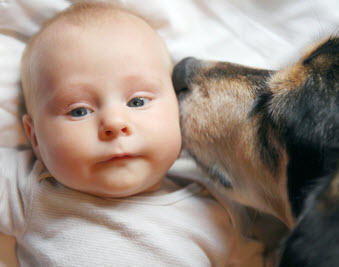As expecting parents, you may be anxious about introducing your new baby to the family dog. But preparing well ahead of your due date and taking your dog’s needs into account will help the transition go as smoothly as possible.
Preparing Your Pup Ahead of Time
Your dog’s lifestyle will be greatly impacted when the new baby arrives. He will experience a whole new world of sounds, smells, routines and behavioral requirements. But there are ways to get your dog ready for his new brother or sister.
- Basic Commands: Take the time to brush up on basic commands – sit, down, wait, stay and settle – which help your dog control his impulsive behaviors. He should also know these – leave it and drop it – which will help when he snags some of the baby’s toys. Also, no jumping around the baby.
- Crate Training: If your dog hasn’t been crate trained, now is the time to do so. The crate will be a safe, secure place for your dog once the baby starts pulling on ears; and a good place to have your pup go when you need to divert your attention, even for a short time.
- Change in Schedule: Once the baby arrives, everyone’s schedule will revolve around the baby’s schedule. And since dogs are creatures of habit, why not shift his daily walks to those times you’ll walk with the baby in the stroller.
- Scope of Attention: If your dog is used to you being there for his every whim, you may want to adjust his expectation by making him wait for your attention. Help him learn to share you with others.
- Access Limitations: Consider which of your dog’s routines will change – will he still sleep on the bed with you, be able to get on the couch if the baby is there, have access to the new nursery? Cesar Millan recommends keeping the nursery off limits, at least initially, and then increasing access only under your supervision.
- Role Playing: Especially if your dog is sensitive to new sights and sounds, you may want to get a baby doll that makes crying noises so the dog gets used to seeing you holding a crying baby, or one in a crib. It can be a great training tool.
Baby’s Homecoming
The top priority is keeping your newborn safe, and taking “baby steps” with your baby’s introduction is especially important, especially if your dog is nervous or anxious.
Before you walk in the door, think about your demeanor. Your dog will be picking up on your every emotion, so you’ll want to be calm, happy and relaxed when you first get home. Greet your dog as you normally would.
When it comes time for the introduction, follow these step-by-step guidelines:
- Put your dog on his leash and have another family member handle him.
- Go to a quiet room without a lot of distractions to get your dog worked up.
- Sit down with your baby in your arms, and have the handler bring the dog into the room.
- Talk to your dog in the same relaxed, loving, encouraging voice he’s used to from you.
- Allow your dog to take his time and approach the baby when he is ready.
- Let your dog sniff the baby’s feet and praise him for his good behavior.
- Adjust to longer periods of time, depending on your dog’s personality.
With most families, these introductions go smoothly to where all your “children” live happily together and develop a lifelong bond. However, if your dog shows any signs of aggression, separate the dog and baby immediately, and seek the help of a professional trainer before any further contact is attempted.
This blog is brought to you by Under the Weather®, provider of bland diet products for dogs. These bland diet products offer a quick and convenient solution when dogs experience digestive issues such as vomiting or diarrhea. Ready to go in minutes – just add boiling water to rehydrate.
Our bland diet recipes are made with 100% human-grade meats – no meat by-products, antibiotic free and no hormones added! They are gluten free and have no chemicals or dyes. Sourced and manufactured in the U.S.A.
View Our Products
Visit Our Blog Library




